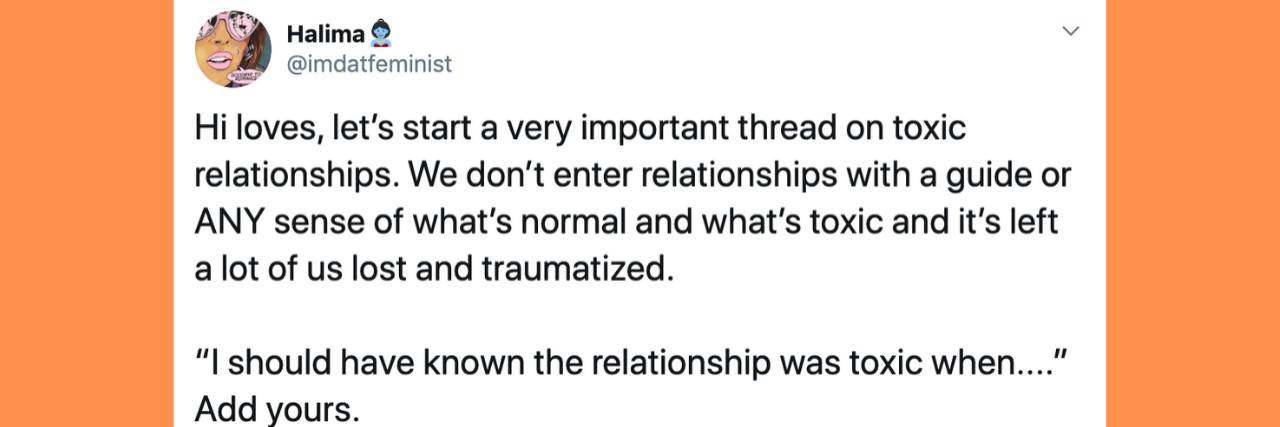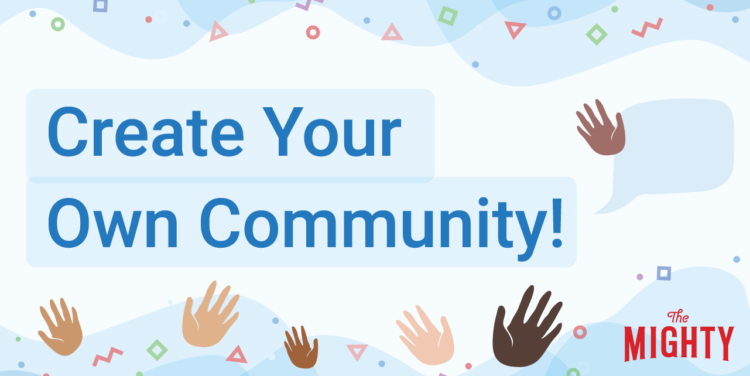Twitter Users Share the 'Red Flags' They Overlooked in Past Toxic Relationships
Most of us have been in a “bad” relationship or two in our lives. But how do you know when a bad relationship becomes toxic? Essentially, the definition of a toxic relationship is any relationship that is damaging to you psychologically, physically, spiritually or emotionally.
Because understanding what makes a relationship harmful can be confusing, Twitter user Halima started a thread on Monday where people could share the toxic signs they wish they had seen sooner in their past relationships. She tweeted:
Hi loves, let’s start a very important thread on toxic relationships. We don’t enter relationships with a guide or ANY sense of what’s normal and what’s toxic and it’s left a lot of us lost and traumatized. ‘I should have known the relationship was toxic when….’ Add yours.
Hi loves, let’s start a very important thread on toxic relationships. We don’t enter relationships with a guide or ANY sense of what’s normal and what’s toxic and it’s left a lot of us lost and traumatized.
“I should have known the relationship was toxic when….” Add yours.
— Halima????♀️ (@imdatfeminist) February 17, 2020
The number of tweets from people who didn’t recognize they were in a toxic relationship serves as a powerful reminder that we need to do a better job talking about the signs of toxic and abusive relationships. The unfortunate reality is that because we seldom talk about these signs, people remain in psychologically damaging relationships for longer than they should.
Find your people on The Mighty! Review the list of communities or start your own in The Mighty app.
Below, you can read what some people shared in response to Halima’s tweet. To see the full thread, head here.
Here are eight toxic “red flags” people overlooked in their past relationships:
1. Digital Abuse
Digital abuse is when a partner uses technology to bully, harass, stalk or intimidate their partner. Common examples may include pressure to send explicit videos, forcing you to disclose social media account passwords or monitoring your phone usage.
He would go through my phone every single time I went over for about 15 minutes, messages, photos,socials.. I was 15 and thought this concept was very normal.
— Soraya???????? (@sorayamdaniel) February 17, 2020
2. Your Partner Controlled Your Appearance
Another classic sign of an abusive relationship is a partner trying to control your appearance. Sometimes this can manifest in the form of keeping you from dressing “too sexy,” encouraging you to “care more about your appearance” by wearing makeup or bullying you to lose weight.
When he kept telling me “I️ should” do something to better my appearance
— Essence Stanley-Savage (@E_Savage21) February 17, 2020
3. You Felt Unable to Voice Your Feelings
Expressing your feelings can be really hard! But if you perpetually feel unable to express your feelings to your partner due to their past rejection, invalidation or ridicule, it could be a sign that your relationship is toxic for you.
I should’ve known the relationship was toxic when I became afraid to express my true feelings out of fear her going off about it.
— Tamera Nevels (@aquarian32) February 17, 2020
4. The Relationship Was ‘Too Fast, Too Soon’
Everyone falls in love at a different pace. Some people fall in love quickly, others take more time. While there is no “right” amount of time for developing intimacy with another person, if your partner pressures you to be at the same level they are, or get upset if the pace of your feelings don’t match theirs, it could be a sign that the relationship is in toxic territory.
…he was already saying he loved me before an official first date or subsequently cementing a relationship.
— Monny (@Mama_Monny) February 17, 2020
5. Your Partner Decided Who You Could Hang Out With
Controlling behavior is almost always toxic. According to the National Domestic Violence Hotline, monitoring where you go, who you call and who you spend time with are tell-tale signs of emotional abuse.
I should have known the relationship was toxic when I constantly had to ask permission to do the things, or talk to the people that I cared about because he was threatened or jealous ????
— Mira (@ohheyitsmira) February 17, 2020
6. Your Partner Never Accepted Blame
Relationships are two-way streets. If your partner insists they are “always right,” or never owns up to their mistakes, it could be time for you to move on. No one is always right all of the time.
I should have known it was toxic when my partner never took responsibility for any issues and bypassed conversations and ownership of his wrong doings. ????
— Charlotte Lace (@CharlotteLaceTO) February 17, 2020
7. Cheating
Though cheating is not always a manifestation of an abusive relationship, it can be. Sometimes a partner will cheat to intentionally hurt you or to prove they are more desired or attractive than you. These cases are examples of abusive behavior.
i should gave known the relationship was toxic when he tried to make me feel low for crying when he cheated when we were fresh in the relationship.
— camrien ???? (@camriendm) February 17, 2020
8. Your Partner Wasn’t Emotionally Supportive
Being an emotionally negligent partner isn’t abuse in and of itself, but if emotional distance is coupled with degrading insults and blame, it can be. A healthy relationship includes mutual respect and support.
Not supporting me emotionally.
Not actively listening to me.
Not Wanting to talk.
Calling me names.
Making me feel insignificant.
Shouting at me.
Blaming me for everything.The list goes on.
My fault for hanging around – but my self esteem was 0 so didn’t want to leave.— Emma-Jayne ???? Ⓥ (@xxEmmajaynecxx) February 17, 2020
If you recognize any of these qualities in a current or past relationship, you’re not alone. To connect with a community that cares, we encourage you to post on The Mighty with the hashtag #TraumaSurvivors. If you or a loved one is affected by domestic violence or emotional abuse and need help, please call The National Domestic Violence Hotline at 1-800-799-7233.
Header image via Twitter


